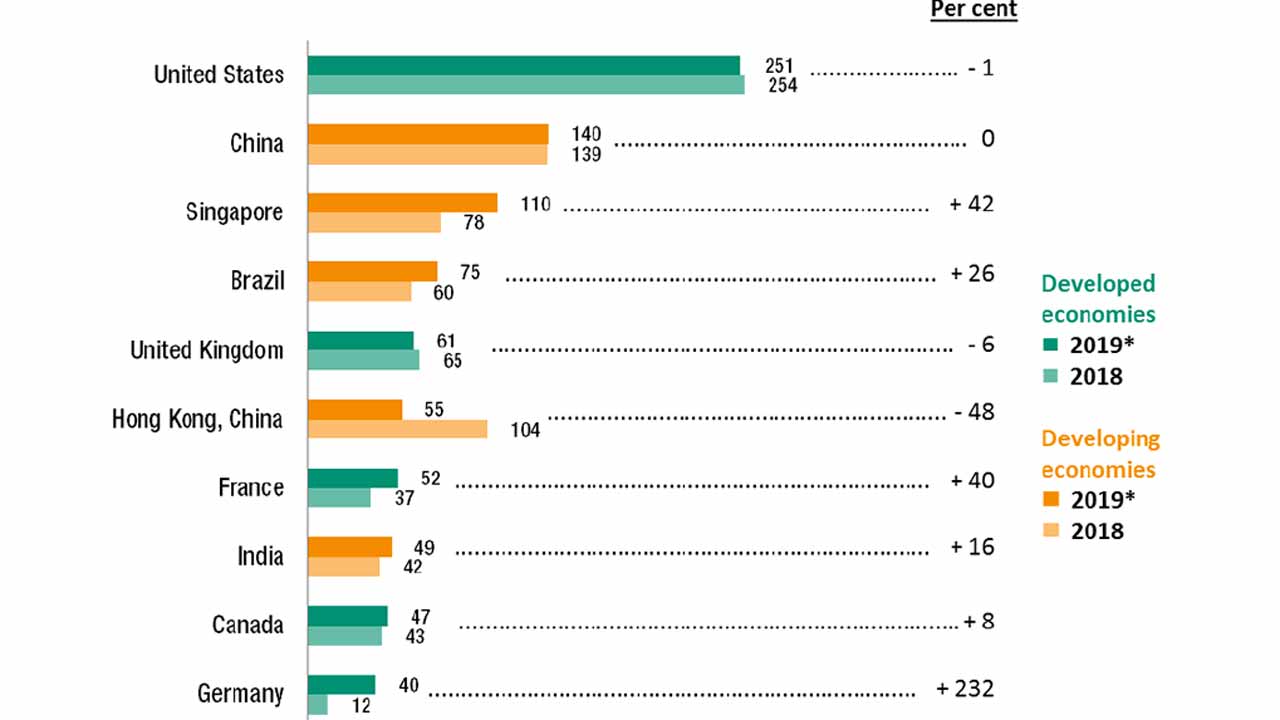
•As investments into Nigeria surge $3.4b
United Nations Conference on Trade and Development (UNCTAD), has said global foreign direct investment (FDI) remained flat in 2019, standing at $1.39 trillion, even as investment surged in Nigeria by 71 per cent to $3.4 billion.
Predicated on weaker macroeconomic performance, and policy uncertainty for investors, including trade tensions, the investment witnessed a one per cent decline from a revised $1.41 trillion in 2018, latest edition of UNCTAD’s Global Investment Trends In 2019 And Beyond, has revealed.
“Flows to developing economies remained unchanged at an estimated $694 billion. FDI increased by 16 per cent in Latin America and the Caribbean and two per cent in Africa. Despite a decline of six per cent, flows to developing countries in Asia continued to account for one-third of global FDI in 2019. Flows to transition economies rose by two thirds to $57 billion,” UNCTAD said.
Specifically, flows to West Africa increased by 17 per cent to an estimated $11 billion, with 71 per cent or $3.4 billion investment going to Nigeria.
“FDI to the continent’s largest economy was buoyed by resource seeking inflows in the oil and gas sector. However, the development of a $600 million steel plant in Nigeria’s Kaduna state offers some evidence of investment diversification, a long-standing policy objective,” the report noted.
The UNCTAD report however indicated that FDI flows may rise marginally in 2020, considering further modest growth of the world economy, adding that corporate profits would remain high and signs of waning trade tensions emerge.
“However, the decrease of announced Greenfield projects by 22 per cent – an indicator of future trends, high geopolitical risks and concerns about a further shift towards protectionist policies temper expectations,” the report noted.
The report stated further that developing economies continue to absorb more than half of global FDI flows, stressing that United States remained the largest recipient of FDI, attracting $251 billion in inflows, followed by China with flows of $140 billion and Singapore with $110 billion.
“FDI flows to Africa amounted to an estimated $49 billion – an increase of three per cent. Persistent global economic uncertainty and the slow pace of reforms seeking to address structural productivity bottlenecks in many economies continue to hamper investment in the continent.
“Egypt remained the largest FDI recipient in Africa with a five per cent increase in inflows to $8.5 billion. The country’s efforts to implement economic reforms have resulted in strengthened investor confidence. While FDI to the country was still driven by the oil and gas sector, major investments in the non-oil economy emerged, notably in telecommunications, real estate and tourism. Despite the increase in Egypt, FDI to North Africa declined by 11 per cent to $14 billion, due to a significant (45 per cent) slowdown in flows to Morocco ($2 billion from $3.6 billion in 2018),” it added.
While FDI to Southern Africa increased by 37 per cent to $5.5 billion mainly due to the slowdown in net divestment from Angola, the report showed that South Africa consolidated last year’s recovery with inflows remaining almost constant at a little more than $5 billion.
The report showed that Flows to Ethiopia, Africa’s fastest growing economy, slowed down by a quarter to $2.5 billion, noting that China was the largest investor in Ethiopia in 2019, accounting for 60 per cent of newly approved FDI projects.



